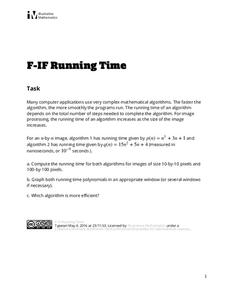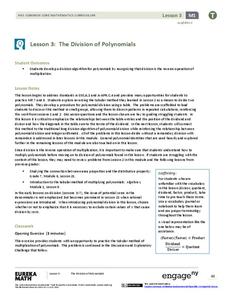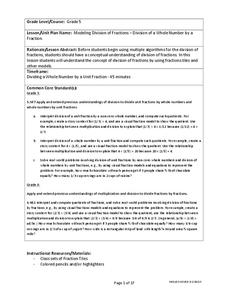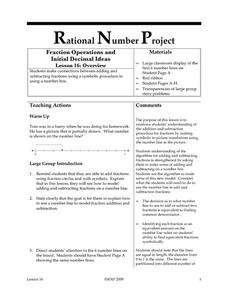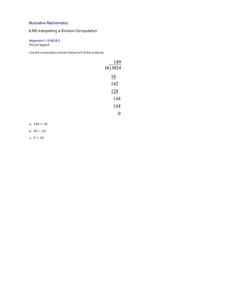EngageNY
The Division Algorithm—Converting Decimal Division into Whole Number Division Using Mental Math
Make math much simpler with mental math methods. The 16th installment in a series of 21 looks at ways scholars can apply mental math to convert division problems into easier problems with the same quotient. Multiplying or dividing both...
Scholastic
Study Jams! Addition with Regrouping
Zoe needs to back up her music collection, but do her friends have enough space on their computers to help? Find out as you teach your class how to add two- and three-digit numbers with regrouping. Place value is emphasized as both the...
EngageNY
The Division Algorithm—Converting Decimal Division into Whole Number Division Using Fractions
Knowing the standard algorithm opens up a whole new world of division. Scholars learn how to convert division involving decimals to division involving whole numbers to use the standard algorithm. Knowing how to multiply with powers of...
EngageNY
Grade 5 Math Module 1, Topic F, Lesson 14
Be sure to place value on place value understanding. Young mathematicians learn to divide decimals by whole numbers when compatible numbers are not available. They use place value discs in place value charts, then connect this strategy...
EngageNY
Dividing Multi-Digit Numbers Using the Algorithm
Scholars learn to divide multi-digit numbers using the standard algorithm in the 14th installment in a module of 21 parts. They get plenty of practice with the algorithm by completing a worksheet.
Virginia Department of Education
Integers: Addition and Subtraction
Young mathematicians construct their own understanding of integers with an inquiry-based math lesson. Using colored chips to represent positive and negative numbers, children model a series of addition and subtraction problems as...
EngageNY
The Long Division Algorithm
Two methods are always better than one! The eighth installment in this series asks pupils to convert decimals to fractions using two approaches. Individuals first use the more traditional approach of long division and then use reverse...
Buffalo State
Adding and Subtracting Positive and Negative Integers
A well-rounded unit on positive and negative integers is a great addition to your middle school math class. Learners work through five activities, each focused on a different skill, before playing a Game of Life to practice the...
Curated OER
Rational Number Project
Infuse your unit on fractions, decimals, and operations with a thorough module about rational numbers. With a teaching guide, learner examples, templates for instruction, and lesson rationale, the module is a solid way to...
Illustrative Mathematics
Running Time
Ever wonder why that computer image takes so long to load? Well, math is involved and provides the algorithms needed to compute the measure in nanoseconds. Young mathematicians plug the image measures into the formulas and compare the...
EngageNY
The Division of Polynomials
Build a true understanding of division of polynomials. Learners use their knowledge of multiplying polynomials to create an algorithm to divide polynomials. The area model of multiplication becomes the reverse tabular method of division.
Center for Mathematics and Technology
Whole Numbers: Using an Area Model to Explain Multiplication
There are many ways to work through a multiplication problem. Using an area model, kids complete several worksheets with different types of multiplication problems, including multiplying by ten, and explain how the new strategies differ...
West Contra Costa Unified School District
Modeling Division of Fractions
Introduce young mathematicians to the process of dividing fractions with a hands-on math lesson. Using the help of fraction strips and other visual models, children work through a series of example problems as they...
Curated OER
Multiplication & Division
Helpful for building a multiplication unit that focuses on different strategies. With explanations about repeated addition and subtraction as foundations for multiplication, scaling, summaries of progression, and basic multiplication and...
Scholastic
Study Jams! Single-Digit Division
Learning the algorithm for long division is no easy task, but this resource helps to break the process into manageable steps. Beginning with an explanation of basic division vocabulary, this presentation goes on to model long division...
5280 Math
Go with the Flow
Round and round they go ... where they stop, only scholars will know. By writing systems of equations, classes determine the number of cars a roundabout can handle given specific constraints. Systems use up to six variables and become...
EngageNY
Comparing Methods—Long Division, Again?
Remember long division from fifth grade? Use the same algorithm to divide polynomials. Learners develop a strategy for dividing polynomials using what they remember from dividing whole numbers.
University of Minnesota
Fraction Operations and Initial Decimal Ideas
Add another strategy to the toolboxes of young mathematicians with this elementary math activity on using number lines to add and subtract fractions.
EngageNY
Dividing by (x – a) and (x + a)
Patterns in math emerge from seemingly random places. Learners explore the patterns for factoring the sum and differences of perfect roots. Analyzing these patterns helps young mathematicians develop the polynomial identities.
West Contra Costa Unified School District
Polynomial Division
Multiply the ways your scholars can find the quotient with polynomial division. A lesson introduces polynomial division via long division, synthetic division, generic area model, and using the definition of division. Learners then...
5280 Math
Capture the Points
Play a game of capture the points. Young scholars receive a number line with specific points graphed and must write an inequality that captures all the points. The second task of the algebra project is to write an inequality with...
Illustrative Mathematics
Interpreting a Division Computation
Mathematicians show their understanding of a division problem. If a student can apply long division to a pair of numbers and determine a quotient, what other factors and multiples become apparent? The example illustrates a simple...
Consumers Energy
The Cost of Electricity
How much is your toaster costing you every day? Young environmentalists calculate the monetary costs of household appliances based on their average consumption of wattage.
Illustrative Mathematics
Gifts from Grandma, Variation 3
There are three money word problems in this activity, each one is set in the same context. The first asks what was the total amount grandma spent, the second how many grandchildren grandma has, and the third asks how much grandma spent...









